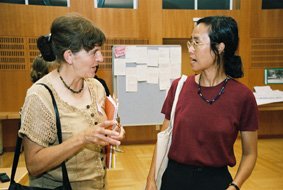At the End of Liberation? Liberation at the End! Feminist Theory, Feminist Theology and the political implications
ESWTR-Conference 2001

9th International Conference, Salzburg (Bildungshaus St. Virgil), 19 th - 23 rd of August 2001
Press Release, 23rd of August 2001:
Feminist renewal of religious traditions
The 9th International Conference of the European Society of Women in Theological Research made visible the relevance of feminist theology for society today. - Lectures and Discussions gave insights into diverse feminist approaches to theology and spirituality. - Participants passed a resolution on new and current biblical translations and the Vatican's recent instruction on liturgies. - An Austrian theologian was elected as the new president of the Society.
160 women theologians coming from 27 countries, including Christian theologians of various denominations, Jewish and Muslim theologians, came together for their 9th International Conference in Salzburg, discussing the political implications of feminist theologies and theories. Lectures and discussions proved how determined feminist theologians are in continuing and renewing their religious traditions from critical feminist perspectives and in developing theological approaches with a full awareness of their political implications. Contributions of feminist theologians have led to wide reaching awakening(s) within and partial renewal of established religious traditions in the past years.
In a resolution on new biblical translations and the Vatican's recent instruction on liturgies, and with a letter of solidarity to the international ecumenical organisation of Women's Ordination WOW (Women's Ordination World-wide), the participants of the conference warn church leaders that to keep ignoring the knowledge feminist theologians have gathered is to lose even more of their credibility.
Responsibility for an Renewal of Traditions
The Jewish theologian and Rabbi of the Viennese Or Chadasch community, Eveline Goodman-Thau, in her opening of the conference, encouraged the participants to take responsibility for their tradition without waiting for recognition by religious institutions. Women should no longer continue discussing their own roles and rights, but simply participate on their own terms.
Marcela Althaus-Reid, an Argentinean Theologian teaching Systematic Theology in Edinburgh/Scotland, criticised in her lecture the lack of recognition of the sexual context of all theologies and the neglection of women and men living their sexualities differently (not according to heterosexual norms) by the theological system.
American theologian Lucy Tatman, who was teaching until recently at the Central European University in Budapest, encouraged her colleagues to take themselves more seriously as theologians and to continue producing knowledge "that can change lives".
Wide diversity in theological and spiritual approaches
Other lectures gave insights into the approaches of Muslim feminists (Sa'diyya Shaik), a historical project focussing on memories of women in the former socialist countries of Central and Eastern Europe (Miroslava Holubova), reflections on racism and the construction of White-ness (Eske Wollrad), gender-concepts in feminist theories (Anne Louise Erickson) and the potential of dialogic imagination for feminist theology and religious studies (Kwok Pui-Ian).
Liturgies at the conference included a Muslim meditation as well as an ecumenical Eucharist celebrated by an Anglican, Old-Catholic and a Protestant woman minister and made both the spiritual diversity and competence of the women present visible.
The global crises as a spiritual crises - Passionate Work for Transformation
In the conference's final lecture, the English theologian Mary Grey identified global crises as spiritual crises and underlined the necessity of passionate work for transformation, which she regards as a central mission of feminist theologians today.
Passing a resolution with the title "Today's God is still free and living" the participants of the conference criticise the identification of God as a male within current translations of the Bible and the Vatican's recent liturgy instructions. A letter of solidarity addressed to the international ecumenical organisation of Women's Ordination WOW (Women´s Ordination World-wide) rejects the exclusion of women through liturgy, language, orders and theology and warns that church leaders will lose the rest of their credibility should they continue to deny women's gifts and competence.
New president plans to strengthen European co-operation
The Austrian theologian Irmtraud Fischer, Professor for Old Testament and Women's Studies in Religion, in Bonn, Germany, was elected as new president of the Society by the General Assembly on Wednesday, the 22nd of August 2001.
Fischer plans to strengthen the European network of theologians by continuing the close co-operation with theologians from Eastern and Central Europe and encouraging contacts with theologians in Southern European countries. At the same time she underlines the need to increase the inclusion of feminist theologians into theology faculties and colleges.

